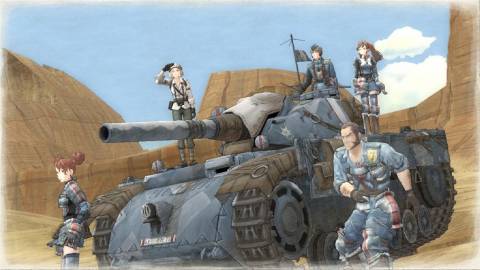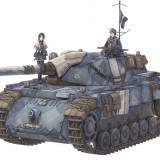Valkyria Chronicles Impressions: At War's End
By Citizengamer 1 Comments
Rather than write another Valkyria Chronicles review, I'll refer you to Pepsiman's excellent writeup here. I just wanted to make a few observations after recently completing the game.
As a bit of a military history buff, I had a ready interest in the Valkyria Chronicles story and its fictional version of World War II Europe ( Europa). Some of the setup actually reminded me more of World War I -- the main enemy takes the form of the East Europan Imperial Alliance and its arrogant leader Maximilian. The Imperials seem intent upon securing a supply of ragnite ore to fuel their tanks and other vehicles during an ongoing dispute with the rival Atlantic Federation, and so they invade the small, neutral country of Gallia. There's also the Darcsen population that represents the scapegoat minority of Europa. Sounds familiar, no?
Players take control of a ragtag militia squad that's helping to defend the small country of Gallia against Imperial aggression. This Squad 7 consists of true citizen soldiers called up to duty to fight alongside the regular Gallian forces. One of them, Welkin Gunther, begins the journey as an unblooded war hero's son with the passion of a naturalist, but quickly becomes embroiled in the larger conflict as the Imperials invade his homeland of Gallia. He's accompanied by Alicia Melchiott, a baker turned militia volunteer, and his adopted sister Isara, who has an engineer's love of all things mechanical. The squad also includes some tougher characters -- Largo is a gruff veteran of the First Europan War who specializes in tank killing with his bazooka-style lance, and songstress Rosie chews up Imperials with machine gun bullets rather than rivets.

Despite the historical parallels to a rather dark period of human history, the game places greater emphasis on the age-old struggle to retain one's humanity in the face of war. Sympathetic characters arise on the Imperial side as well, ranging from lowly recruits and mid-ranking officers up to the highest echelons of Maximilian's command. The game even touches upon issues such as torture and the Holocaust, although it's not the most nuanced treatment you'll find in a wartime story.
At least the World War II retelling seems more fresh in the context of the more traditional RPG story elements, which include some absurdly large war machines and hidden powers waiting to be unveiled. The characters and general art design are gorgeous and a delight to behold, and also serve as a reminder that you're not playing a gritty war game in the vein of Call of Duty. The integration of RPG character progression and turn-based strategy go a long way toward endearing the members of Squad 7 to you -- even the lowliest engineers or scouts each have their own character traits that manifest as buffs or debuffs on the battlefield.
It says a lot about the emotional impact of the game's characters that I still ended up with a smile as the credits rolled, despite part of the ending coming off as a bit too contrived for my liking. Storytelling bumps aside, I can't recommend the game enough for any PS3 owner who has even the slightest shred of interest. All the human elements of a good war story are there -- but just keep in mind that no character is going to walk away from the Second Europan War with PTSD.
P.S. I'd be doing the game injustice to not mention the lush orchestral arrangements that make up the musical score. For a sampler from the game intro, see below.

Log in to comment